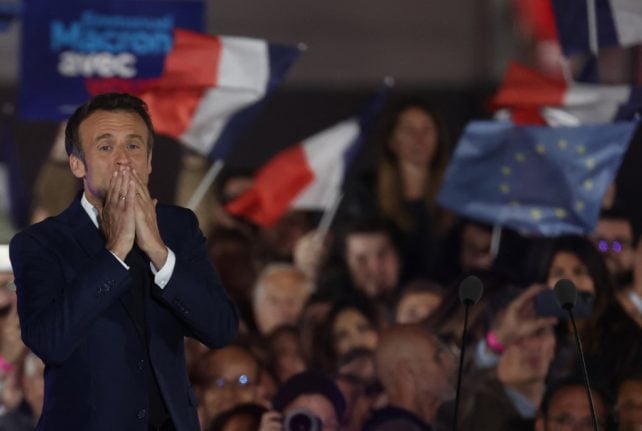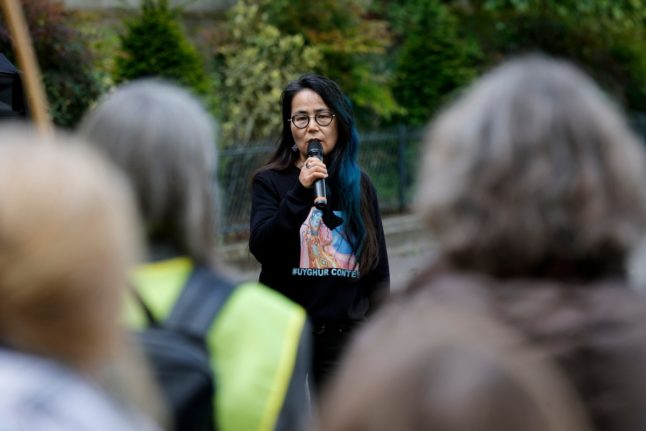The final results were released shortly before 2am and had the centrist incumbent Macron on 58.55 percent of the vote, beating his far-right rival Marine Le Pen who took 41.45 percent.
Macron is the first French president to win a second term for two decades, but Le Pen’s result also marks the closest the far-right has ever come to taking power in France and has revealed a deeply divided nation.
READ ALSO As it happened: Macron wins re-election for a second term
The 44-year-old president faces a litany of challenges in his second term, starting with parliamentary elections in June, where keeping a majority will be critical to ensuring he can realise his ambitions to reform France.
READ ALSO Macron victory: What happens next?
Several hundred demonstrators from ultra-left groups took to the streets in some French cities to protest Macron’s re-election and Le Pen’s score. Police used tear gas to disperse gatherings in Paris and the western city of Rennes.
In a victory speech on the Champ de Mars in central Paris at the foot of the Eiffel Tower, Macron vowed to respond to the anger of voters who backed his far-right rival, saying his new term would not continue unchanged from the last five years.
“An answer must be found to the anger and disagreements that led many of our compatriots to vote for the extreme right,” he told thousands of cheering supporters.
“It will be my responsibility and that of those around me.
He also pledged a “renewed method” to govern France, adding that this “new era” would not be one of “continuity with the last term which is now ending”.
Read the full report of Macron’s speech HERE.
In a combative speech to supporters in Paris in which she accepted the result but showed no sign of quitting politics, Le Pen, 53, said she would “never abandon” the French and was already preparing for the June legislative elections.
“The result represents a brilliant victory,” she said to cheers.
“This evening, we launch the great battle for the legislative elections,” Le Pen said, adding that she felt “hope” and calling on opponents of the president to join with her Rassemblement National party.
Read the full report of Le Pen’s speech HERE.
The result is narrower than the second-round clash in 2017, when the same two candidates met in the run-off and Macron polled over 66 percent of the vote.
For Le Pen, her third defeat in presidential polls will be a bitter pill to swallow after she ploughed years of effort into making herself electable and distancing her party from the legacy of its founder, her father Jean-Marie Le Pen.
Critics insisted her party never stopped being extreme-right and racist while Macron repeatedly pointed to her plan to ban the wearing of the Muslim headscarf in public if elected.
The results caused immense relief in Europe after fears a Le Pen presidency would leave the continent rudderless following Brexit and the departure from politics of German chancellor Angela Merkel.
Italian Prime Minister Mario Draghi called Macron’s victory “great news for all of Europe” while German Chancellor Olaf Scholz said French voters “sent a strong vote of confidence in Europe today”.
EU president Charles Michel said the bloc could now “count on France for five more years” while Commission chief Ursula von der Leyen also congratulated him, saying she was “delighted to be able to continue our excellent cooperation”.
In another election Sunday, Slovenia’s three-time Prime Minister Janez Jansa, criticised by opponents as an authoritarian right-wing populist, was at risk of losing power to a party led by political newcomer Robert Golob.
Macron will be hoping for a less complicated second term that will allow him to implement his vision of more pro-business reform and tighter EU integration, after a first term shadowed by protests, then the pandemic and finally Russia’s invasion of Ukraine.
But he will have to win over those who backed his opponents and the millions of French who did not bother to vote.
The official turnout figure was just 71.99 percent, the lowest in any presidential election second-round run-off since 1969.
The hard-left third-placed candidate in the first round, Jean-Luc Mélenchon, had refused to endorse Macron.
He has his eyes firmly set on the June parliamentary elections.
READ ALSO French parliamentary elections: When do they happen and why are they important?
Mélenchon welcomed Le Pen’s defeat as “very good news for the unity of our people” but said Le Pen and Macron had barely managed to win a third of support from registered voters.
Macron “is submerged in an ocean of abstention and spoilt ballots”, he said.



 Please whitelist us to continue reading.
Please whitelist us to continue reading.
Member comments